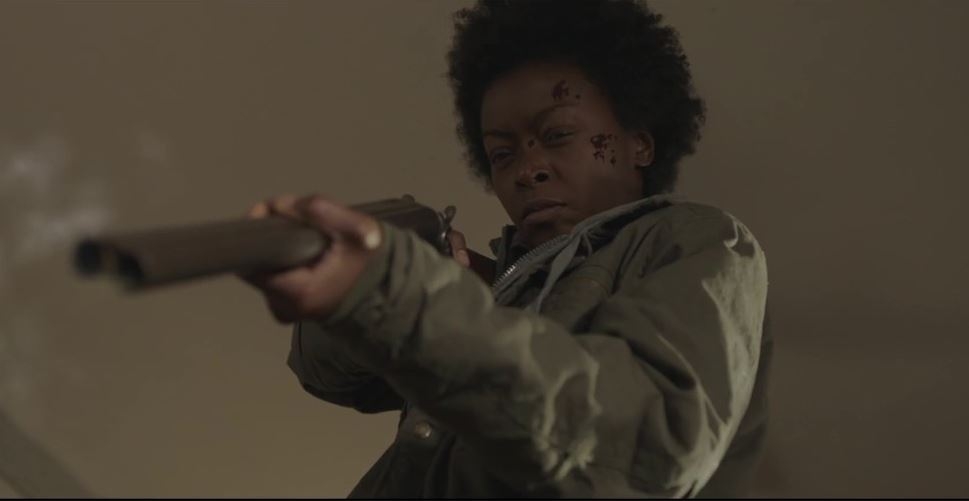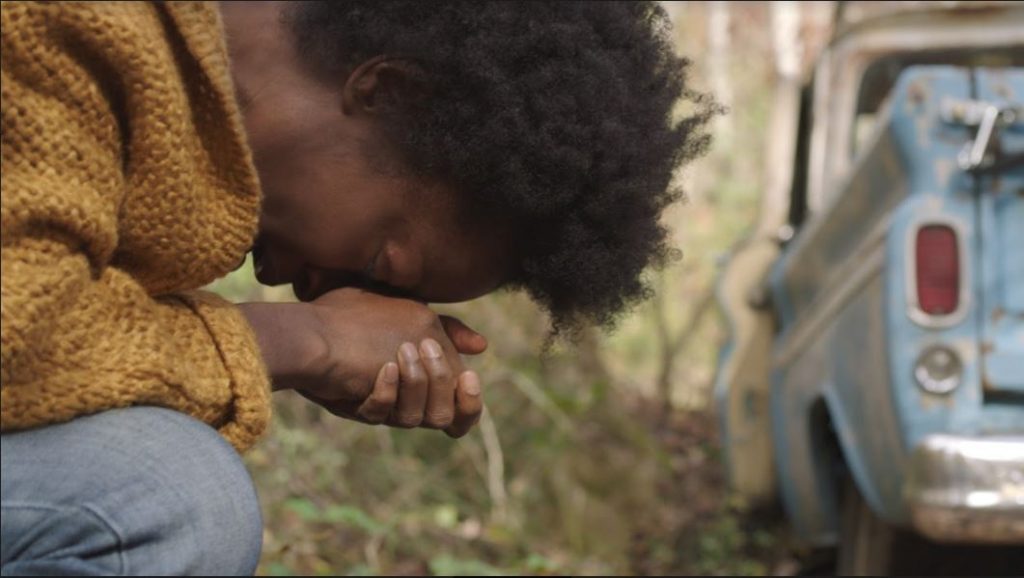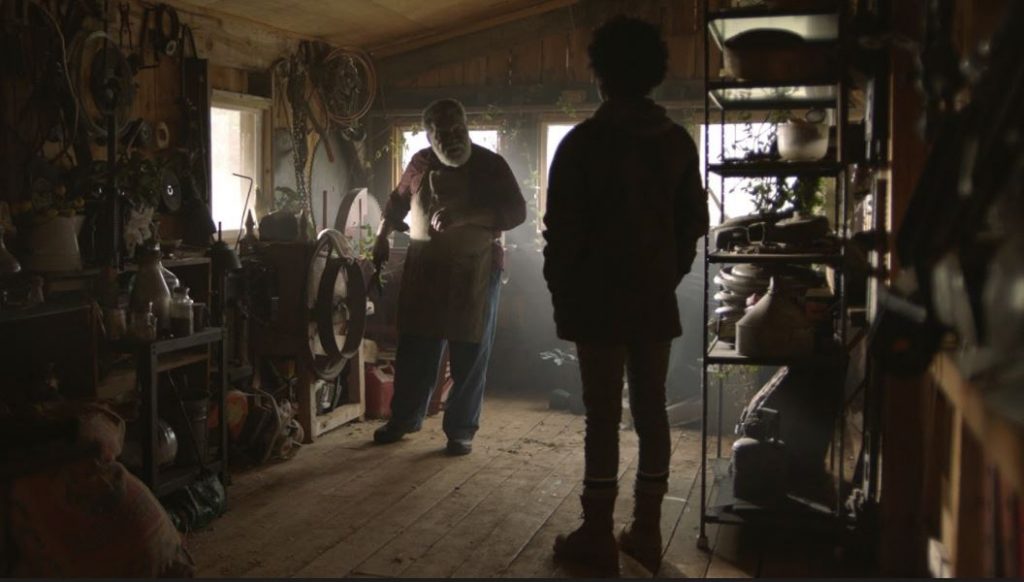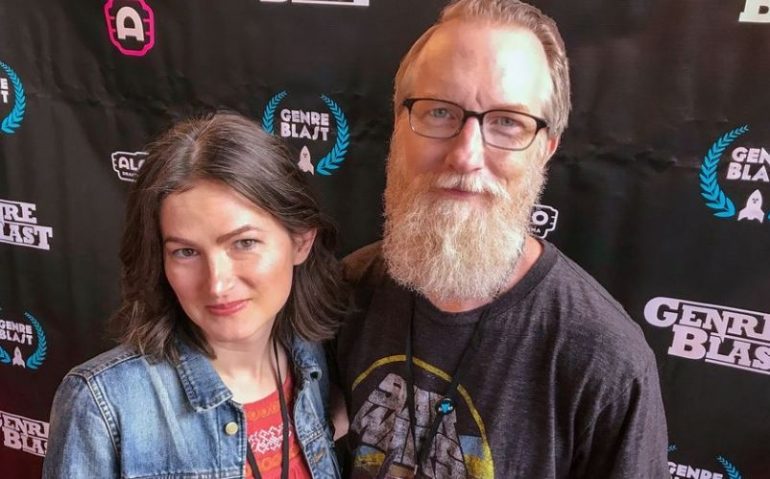Ruckus and Lane Skye are having a creatively successful year despite the ongoing global pandemic. Just six months ago, a film they wrote, BECKY was released and became one of the few surprise success stories of 2020 both critically and financially. Now the duo is back with another film, THE DEVIL TO PAY, that they not only penned the script for but it also marks their feature-length directorial debut as well.
THE DEVIL TO PAY tells the story of Lemon (Danielle Deadwyler, HBO’s WATCHMEN), a struggling farmer in an isolated Appalachian community fighting to protect her only child after her husband mysteriously disappears leaving her with a debt to the head of the most powerful family on the mountain; a debt that could destroy a decade long truce and send the entire community into violent chaos.
THE DEVIL TO PAY is a tense, well-crafted thriller that shows the success that Ruckus and Lane had with BECKY was no fluke. So, I was excited to get on the phone with the two of them and talk all about the film, the success of BECKY, their love of “Southern Gothic” stories, and more.
_______
What was the genesis of your new film, THE DEVIL TO PAY?
[Rukus] – Well, we met [our lead actress] Danielle Deadwyler through the Atlanta arts community and the three of us expressed interest in working together but didn’t have a specific project. And finally, Lane and I were like, “Why don’t we just write a film for her to star in?” We wanted to make a Southern Gothic thriller starring her and that was it. We were like, “What do we want to see her do?” So, we wrote it and Danielle had no idea we were doing this. We just did it and then handed her a script and crossed our fingers hoping she would like it. And then she did like it. We set a date and said, ‘we’re shooting in three months” and willed it into existence basically.
What about the concept itself though; these “backwoods” societies with their own codes of conduct, for example? What inspired you to bring that into the story, and ultimately, the film?
[Lane} – Well, we’ve always really been into just Southern Gothic in general. Right. But a couple of years before we wrote this, we went on a road trip to the South and we saw the museum of Appalachian history in Tennessee which is just a phenomenal museum [https://www.museumofappalachia.org/] if you get a chance to go. But it’s basically one guy’s collection and they’re all these little handwritten notes under each of the items. Like there’s an exhibit… My favorite was a glass eye and the pocket knife that took out the real eye and the story of how it happened.
Wow.
[Lane] – I think we kind of put all of that in our brains, going through all of that strange stuff and just were like, “We have to put this stuff in a movie someday.”
[Rukus] – We love stories and movies about little insularly communities because they all kind of naturally develop their own rule. Like, “This is how things work around here and deal with it or leave.” And we’ve always been fascinated by that. We just wanted to take that to an extreme and have the place really cut off from the rest of the society.

What was the biggest adjustment to go from writing a script to actually directing it?
[Lane] – Well, we originally started wanting to be directors with no real thought towards being screenwriters. We just needed things to shoot, so we started writing for ourselves just so that we had something to shoot.
[Rukus] – Yeah, originally [our first produced screenplay] RATTLE THE CAGE we wrote for us to direct. That was going to be our first film seven years ago and through a long, crazy story, it ended up getting made in Arabic in another country and then people started wanting to hire us to write. So, I like to say we accidentally became screenwriters. Our intention was always to make a film, but it is so hard to get a film off the ground as directors, especially if you haven’t directed one before. Anyways, all of that is to say we’ve been building towards this for a long time. It wasn’t just out of nowhere that we wanted to do it.
[Lane] – But it was really satisfying being able to see something through, from conception to completion and having our vision the whole way through and just having control over all that was really great.
[Rukus] – We loved it. We absolutely want to do it again. We have several scripts ready to go, hoping that when things calm down, when the pandemic hopefully secedes, we’ll get to make another one.
As a creative duo, how do you split up the duties of filmmaking on the actual set?
[Rukus] – Well, first of all, the big rule is that if we’re on a scene or a set up, we don’t move on until we’re both happy. So regardless of who’s doing what at the time, we just know going in that we both have to agree that we’re happy with where we’re at before we move on. So, no matter what’s happening that day, as long as that’s going on, we both know we’re going to be okay. I tend to be slightly more on the technical side of the camera work. And Lane seems to be slightly more on the emotional work with the actors, but it totally depends on the scene and who’s on set that day and what it needs at the time. We feel it out a little bit. But we try not to do the same job at the same time.
Like if I decided to take something on, she sits back and lets me give that a try and then comments on it and vice versa. The main thing we try to do as a team is not make things more confusing for everyone, which can easily happen.
[Lane] – Usually we’ve done all the prep together. We wrote the story together. So, our brains are in a very, very similar space.
[Rukus] – Most of the arguing happens when we’re writing something. Once we’re on set, we are going for the same thing.

What are your biggest influences as filmmakers and as screenwriters?
[Rukus] – Honestly, as filmmakers, we get so much from other mediums that aren’t films, if that doesn’t sound like a cop out answer. We draw so much from like Southern Gothic literature, and music has such a big influence on the way we shoot things. We love outsider art and things like that. All of that creeps into our filmmaking in ways that if we did nothing but watch films, it wouldn’t, you know?
[Lane]- Yeah.
[Rukus] – That being said, if I listed off some of my favorite films, you would be like, “What? How does that equal THE DEVIL TO PAY?” Some of my favorite films of all time are A FEW GOOD MEN and AS GOOD AS IT GETS and THE CABLE GUY.
[Everyone laughs]
[Rukus] – They have nothing in common, but I could watch those over and over. So, it’s hard to say how those are influencing me.
You mentioned music. What are some of the musical influences on THE DEVIL TO PAY?
[Rukus] – I’ve been a songwriter since I was a teenager and been in bands. So, that has had a huge influence on our movies. A lot of the films we’ve made, I’ve written a song for the end credits and things like that. There’s two scenes in this film that are very musically driven, where it seems like a character on camera is playing a song or singing a song that becomes part of the score and how they’re interwoven. I love that type of stuff.
[Lane] – On this film specifically, Brad Carter (SONS OF ANARCHY) who actually plays one of the villians in the film is a composer, and so before we started shooting, he read the script and he just recorded a couple of little music cues, just based on his inspiration from reading the script. And they were so beautiful that they influenced the visuals. Being able to hear that ahead of time, we were like, “Oh, we’ve got to do this here.”
[Rukus] – It changed the way we shot some scenes knowing this piece of Brad’s music was going to be under it. But it only happened because he had read the script. It was really cool the way it built on itself. So that kind of stuff happens all the time.

Two elements that have appeared in all three of your produced screenplays are isolation and extreme violence. Why have those things been a constant in your work so far?
[Lane] – Well, I think some of it goes back to Southern Gothic and literature and how they all are violent. It’s just a way of life. It’s part of the fabric about stories of rural life.
[Rukus] – It’s just the type of films we’re drawn to write. We like to say we write heartwarming stories where people are murdered.
[Everyone laughs]
[Rukus] – That’s how we describe it.
[Lane] – Well, and I think with a topic like violence and how you engage with it- how it influences your life, that is something we’re interested in exploring. In this movie, Lemon tries to resist it. She gives everybody a chance to solve it another way and everybody makes the wrong choice. In the earlier movies too, there’s just different choices and they choose to engage with violence. I just think that stuff is really interesting.
All of your protagonists seem to resist violence at first. Not to over analyze it but that seems to be another reoccurring element of your work.
[Rukus] – I like hearing you analyze it because we don’t necessarily do that when we are creating it.
What was your favorite aspect of making THE DEVIL TO PAY?
[Rukus] – I love the spontaneity of being on set and no matter how much you plan, you never know exactly what’s going to happen when the camera’s rolling and you have actors there. Especially when you have elements like live animals and things like that. That’s just so fun because there’s several magic moments of things that happen that are way better than we could have ever expected. And that part is just fun. What I love about filmmaking, the entirety of it, is that there’s writing and then there’s shooting it and then there’s editing it and they’re all distinct phases and by the time you get tired of one, you’re ready to move on to the next one. So, it’s hard to get old after a while. But, being on set was my favorite part.
{Lane] – I think my favorite part was that first day on set, getting Danielle up on camera and seeing her embody this character we wrote and just feeling how special that was going to be. We knew she was talented. That’s why we wrote it for her, but just seeing what she was doing with the character was so exciting and just made me feel like, “Oh wow, she took this thing that we wrote and made it better,” which is always a thrill.
[Rukus] – Yeah. We literally looked at each other and we’re like, “This is going to be a movie. A real movie.”
Danielle has so much presence on screen. What was the most difficult aspect of making the film?
[Lane] – Yeah. She is phenomenal. I think the hardest thing was just doing it so quickly. We shot over 19 days and it’s an ambitious film for that kind of schedule.
[Rukus] – It’s a small, scrappy, indie film, so there were plenty of budgetary restrictions. It’s just that typical indie thing of trying to make it feel as big as you can within the budget that you have, but it was a fun challenge.
THE DEVIL TO PAY is your second project to come out in this year. The first was BECKY, which ended up getting a lot of praise and positive responses. Has its success had a positive impact on your careers?
[Lane] – We hope so. It was really exciting to see the response to BECKY. You make something and you hope it’s going to be good and that people are going to watch it. So, it finally came out and because of the weird situation it came out in with the pandemic, it received a much bigger reaction than we were expecting.
[RukuS] – It definitely got attention that it might not have had the studio had a bunch of films in the theaters. It’s absolutely been a positive thing career-wise for sure. There’s a lot of things in the hopper that are happening that we unfortunately can’t talk about yet.
Well, I can’t wait to find out what those things are in the future. Thank you both for taking time to talk with me. I wish you nothing but success with THE DEVIL TO PAY and whatever comes next.
[RukuS] – It was a real pleasure. Thank you.
_________
THE DEVIL TO PAY is available now on DVD, VOD, and in theaters.






